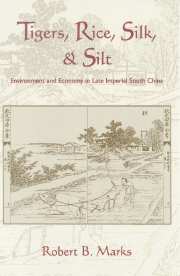Book contents
- Frontmatter
- Contents
- List of Maps, Figures, and Tables
- Dynasties, Qing Dynasty Emperors' Reign Dates, and Weights and Measures
- Acknowledgments
- Tigers, Rice, Silk, and Silt
- Introduction
- 1 “Firs and Pines a Hundred Spans Round”: The Natural Environment of Lingnan
- 2 “All Deeply Forested and Wild Places Are Not Malarious”: Human Settlement and Ecological Change in Lingnan, 2–1400 CE
- 3 “Agiriculture Is the Foundation”: Economic Recovery and Development of Lingnan During the Ming Dynasty, 1368–1644
- 4 “All the People Have Fled”: War and the Enviroment in the Mid-Seventeenth Century Crisis, 1644–83
- 5 “Rich Households Compete to Build Ships”: Overseas Trade and Economic Recovery
- 6 “It Never Used to Snow”: Climatic Change and Agricultural Productivity
- 7 “There Is Only a Certain Amount of Grain Produced”: Granaries and the Role of the State in the Food Supply System
- 8 “Trade in Rice Is Brisk”: Market Integration and the Environment
- 9 “Population Increases Daily but the Land Does Not”: Land Clearance in the Eighteenth Century
- 10 “People Said that Extinction Was Not Possible”: The Ecological Consequences of Land Clearance
- Conclusion
- Bibliography
- Index
Introduction
Published online by Cambridge University Press: 17 August 2009
- Frontmatter
- Contents
- List of Maps, Figures, and Tables
- Dynasties, Qing Dynasty Emperors' Reign Dates, and Weights and Measures
- Acknowledgments
- Tigers, Rice, Silk, and Silt
- Introduction
- 1 “Firs and Pines a Hundred Spans Round”: The Natural Environment of Lingnan
- 2 “All Deeply Forested and Wild Places Are Not Malarious”: Human Settlement and Ecological Change in Lingnan, 2–1400 CE
- 3 “Agiriculture Is the Foundation”: Economic Recovery and Development of Lingnan During the Ming Dynasty, 1368–1644
- 4 “All the People Have Fled”: War and the Enviroment in the Mid-Seventeenth Century Crisis, 1644–83
- 5 “Rich Households Compete to Build Ships”: Overseas Trade and Economic Recovery
- 6 “It Never Used to Snow”: Climatic Change and Agricultural Productivity
- 7 “There Is Only a Certain Amount of Grain Produced”: Granaries and the Role of the State in the Food Supply System
- 8 “Trade in Rice Is Brisk”: Market Integration and the Environment
- 9 “Population Increases Daily but the Land Does Not”: Land Clearance in the Eighteenth Century
- 10 “People Said that Extinction Was Not Possible”: The Ecological Consequences of Land Clearance
- Conclusion
- Bibliography
- Index
Summary
While prominent environmental historians in the West have referred to China's mode of agriculture as a model of sustainable development, that is a dubious claim. Rather, as this history of south China will show, by the turn of the nineteenth century, biodiversity in Lingnan had declined significantly, and the region was “leaking” huge amounts of energy that could only be replenished with massive rice imports to feed the booming human population. Simply put, agriculture in late imperial south China was unsustainable without increasingly greater inputs, and the drive to keep the system in balance led to a substantial remaking of both the environment and the economy of south China over the centuries covered in this book.
By way of defining (and defending) my choice of the two large and inclusive concepts of “environment” and “economy” both in the title and for the focus of this book, let me begin by explaining how the book came to be. I wish I could say I had the plan worked out when I began the research for it some 10 years ago, but that is not the case. In fact, what I have ultimately written is the result of an intellectual journey that began with the problem of food supply: How did the Chinese economy supply food, usually in sufficient quantity, to sustain a growing population during the late imperial period, and what were the economic and social consequences of producing too little or too much food?
- Type
- Chapter
- Information
- Tigers, Rice, Silk, and SiltEnvironment and Economy in Late Imperial South China, pp. 1 - 15Publisher: Cambridge University PressPrint publication year: 1998
- 25
- Cited by



